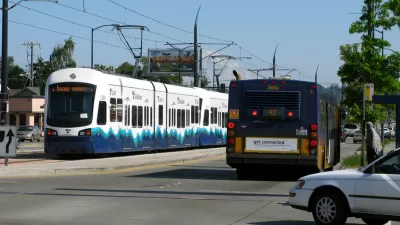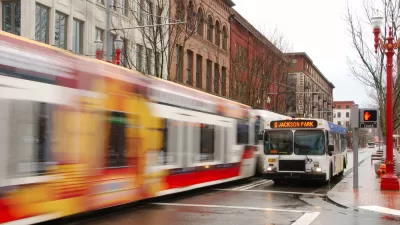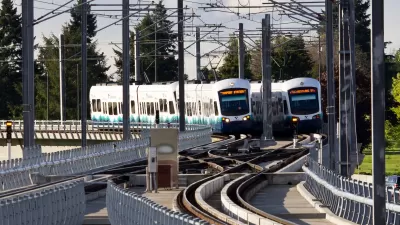Opponents of the ST3 transit funding measure in Seattle have argued that bus rapid transit is a cheaper alternative to light rail. A local write counter argues that point by making the economic case for light rail.

"A common criticism of the upcoming ST3 ballot measure is that light rail is too expensive and we’d be better off with bus rapid transit (BRT)," according to an article by Anton Babadjanov. In response to the argument for a less robust build-out of public transit infrastructure, Babadjanov examines the economics behind a range of proposed alternatives for addressing the congested state of roads around the region.
First, Babadjanov debunks the idea that wider highways would solve the Seattle region's traffic woes, based on concepts of induced demand and the massive size of the freeways that would be necessary to reach same level of lane-miles per capita as a city like Kansas City.
On the issue of buses, Babadjanov argues that for a bus to be an acceptable alternative to driving it needs to offer an alternative to traffic. Because long stretches of high-occupancy vehicle lanes are politically untenable, only new right-of-way remains as a path around congestion. But here's the rub: new right-of-way is actually the expensive part of constructing new light rail, and 80 percent of the cost for light rail in the ST3 proposal would go to right-of-way, according to Babadjanov.
So the argument goes: while Sound Transit is busy planning and building new right-of-way, it might as well make the most efficient use of it, with light rail instead of bus rapid transit.
FULL STORY: BRT Is Not Cheaper Than Light Rail

Trump Administration Could Effectively End Housing Voucher Program
Federal officials are eyeing major cuts to the Section 8 program that helps millions of low-income households pay rent.

Planetizen Federal Action Tracker
A weekly monitor of how Trump’s orders and actions are impacting planners and planning in America.

Ken Jennings Launches Transit Web Series
The Jeopardy champ wants you to ride public transit.

Crime Continues to Drop on Philly, San Francisco Transit Systems
SEPTA and BART both saw significant declines in violent crime in the first quarter of 2025.

How South LA Green Spaces Power Community Health and Hope
Green spaces like South L.A. Wetlands Park are helping South Los Angeles residents promote healthy lifestyles, build community, and advocate for improvements that reflect local needs in historically underserved neighborhoods.

Sacramento Plans ‘Quick-Build’ Road Safety Projects
The city wants to accelerate small-scale safety improvements that use low-cost equipment to make an impact at dangerous intersections.
Urban Design for Planners 1: Software Tools
This six-course series explores essential urban design concepts using open source software and equips planners with the tools they need to participate fully in the urban design process.
Planning for Universal Design
Learn the tools for implementing Universal Design in planning regulations.
Heyer Gruel & Associates PA
Ada County Highway District
Institute for Housing and Urban Development Studies (IHS)
City of Grandview
Harvard GSD Executive Education
Toledo-Lucas County Plan Commissions
Salt Lake City
NYU Wagner Graduate School of Public Service





























